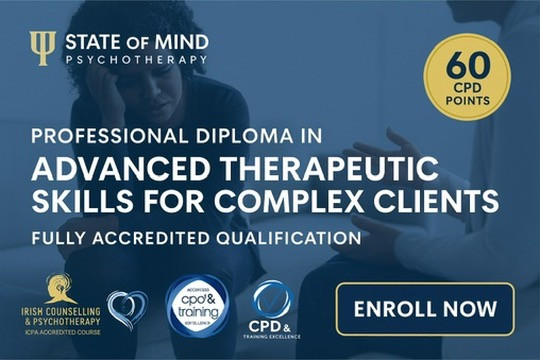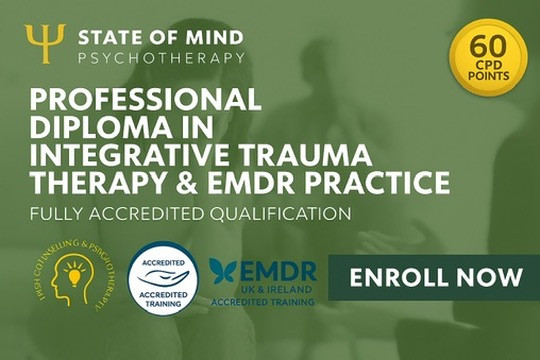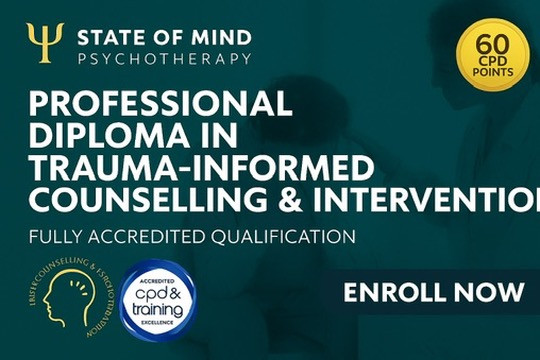This category focuses on the study of psychological trauma, its impact on the mind and body, and effective therapeutic responses. Courses cover trauma theory, PTSD, complex trauma, and evidence-based interventions. Ideal for mental health professionals seeking to deepen their understanding and clinical skills in trauma-informed care.
- Course Manager: Professional Development Consortium (Accreditating Body)
- Course Manager: Marie (Student Support)
- Course Manager: Professor Helen Noble
- Senior Lecturer: Dr. Hugh Cummins
- Senior Lecturer: Dr. Michael McArdle
The Professional Diploma in Advanced Therapeutic Skills for Complex Clients is designed for experienced practitioners who work with individuals presenting with multiple, longstanding or high-risk difficulties. The course focuses on deepening your clinical thinking and broadening your skills so you can stay steady, effective and compassionate in the face of complexity, uncertainty and strong emotions.
You will explore the nature of “complexity” in clinical work, including chronic and co-occurring difficulties such as trauma, personality-related issues, self-harm and suicidality, addiction, eating difficulties, relational instability, and physical and mental health comorbidity. The programme examines how attachment histories, shame, dissociation, neurodiversity, and systemic factors like poverty, discrimination and marginalisation shape presentation and impact engagement with services.
A core focus of the course is on formulation-driven, integrative practice. You will learn to draw on and flexibly combine ideas from different therapeutic models, including psychodynamic, humanistic, cognitive-behavioural, trauma-focused, and relational approaches, in a way that is coherent and responsive to each client. Emphasis is placed on pacing, boundaries, risk assessment and management, working with ambivalence and rupture, and sustaining a collaborative alliance over time.
The programme also pays particular attention to therapist factors: countertransference, burnout, vicarious trauma, and the emotional impact of working with high levels of distress and risk. You will be supported to use supervision more effectively, to reflect on your own patterns in the work, and to develop sustainable practices that protect both you and your clients.
Teaching methods typically include lectures, case-based learning, live demonstrations, structured skills practice, reflective groups, and opportunities to bring your own anonymised material. This diploma is particularly suited to counsellors, psychotherapists, psychologists, social workers, mental health and social care professionals. By the end of the course, you will have a more nuanced clinical lens, a stronger and more flexible skillset, and increased confidence in working safely, creatively and ethically with complex clients and contexts.
- Course Manager: Professional Development Consortium (Accreditating Body)
- Course Manager: Marie (Student Support)
- Senior Lecturer: Dr. Hugh Cummins
- Senior Lecturer: Dr. Michael McArdle
- Senior Lecturer: Professor Helen Noble
- Course Manager: Professional Development Consortium (Accreditating Body)
- Course Manager: Marie (Student Support)
- Course Manager: Professor Helen Noble
- Senior Lecturer: Dr. Hugh Cummins
- Senior Lecturer: Dr. Michael McArdle
The Professional Diploma in Integrative Trauma Therapy & EMDR Practice is designed for practitioners who wish to work more confidently and effectively with clients affected by trauma, using a flexible, evidence-informed approach. The course brings together key principles of integrative psychotherapy with the structured, phase-based model of Eye Movement Desensitisation and Reprocessing (EMDR), supporting you to develop a coherent, trauma-focused way of working.
You will explore the neuroscience of trauma, the impact of overwhelming experiences on the brain and nervous system, and how symptoms such as hyperarousal, avoidance, flashbacks, dissociation, and relational difficulties can be understood as adaptations rather than pathology. The programme examines single-incident, complex, and developmental trauma, with attention to attachment, shame, and the role of the body in trauma memory.
A central focus of the diploma is on EMDR as a therapeutic method. You will be introduced to the theory underpinning EMDR, the eight-phase protocol, assessment and case formulation, preparation and stabilisation, target sequencing, and the use of bilateral stimulation. Emphasis is placed on safety, resourcing, pacing, and working collaboratively with clients’ strengths and capacities.
Alongside EMDR, the course integrates elements from person-centred, psychodynamic, cognitive-behavioural, and somatic approaches, helping you to tailor interventions to the needs, preferences, and readiness of each client. You will also consider ethical issues, risk, complex presentations, and working with diverse populations and contexts.
Teaching methods typically include lectures, demonstrations, experiential exercises, supervised practice, and reflective discussion. You will have opportunities to practise core skills in a supported environment and to link learning directly to your own clinical or support work.
This diploma is particularly suited to counsellors, psychotherapists, psychologists, mental health professionals, and experienced practitioners in related fields. By the end of the course, you will have a stronger theoretical and practical grounding in integrative trauma therapy and EMDR practice, greater confidence in planning and delivering trauma-focused interventions, and an enhanced capacity to work safely, compassionately, and sustainably with trauma in your professional context.
- Course Manager: Professional Development Consortium (Accreditating Body)
- Course Manager: Marie (Student Support)
- Senior Lecturer: Dr. Hugh Cummins
- Senior Lecturer: Dr. Michael McArdle
- Senior Lecturer: Professor Helen Noble
- Course Manager: Professional Development Consortium (Accreditating Body)
- Course Manager: Marie (Student Support)
- Course Manager: Professor Helen Noble
- Senior Lecturer: Dr. Hugh Cummins
- Senior Lecturer: Dr. Michael McArdle
The Professional Diploma in Trauma-Informed Counselling & Intervention is designed for practitioners who wish to deepen their understanding of psychological trauma and develop compassionate, practical skills for supporting survivors. The course provides a solid foundation in the neuroscience and psychology of trauma, including how overwhelming experiences affect the brain, body, emotions, relationships, and sense of self over time.
You will explore different types of trauma, such as single-incident events, complex and developmental trauma, attachment-related difficulties, and intergenerational trauma. Particular attention is given to how trauma may present in everyday settings, including anxiety, depression, dissociation, self-harm, substance use, relational difficulties, and physical health complaints. Throughout, you will be encouraged to view behaviour through a trauma-informed lens: asking “what happened?” rather than “what is wrong?”.
The programme emphasises safety, stabilisation, and empowerment. You will learn practical techniques for grounding, emotional regulation, and building resources, as well as principles for pacing, boundaries, and managing triggers. The course also introduces key therapeutic approaches used in trauma work, such as person-centred, cognitive-behavioural, somatic, and relational perspectives, helping you understand where your role begins and ends and when to refer on.
Teaching methods typically include lectures, experiential exercises, reflective practice, skills training, and case discussion. You will be supported to apply learning to your own context, whether that is counselling, social care, education, youth work, health, community or voluntary services.
This diploma is suitable for those already working in helping roles who wish to work more safely and effectively with people impacted by trauma. By the end of the course, you will have increased confidence in recognising trauma responses, responding in a grounded and attuned way, and contributing to trauma-informed environments and services. You will also be encouraged to prioritise self-care and vicarious trauma awareness, supporting your own wellbeing as you support others.
- Course Manager: Professional Development Consortium (Accreditating Body)
- Course Manager: Marie (Student Support)
- Senior Lecturer: Dr. Hugh Cummins
- Senior Lecturer: Dr. Michael McArdle
- Senior Lecturer: Professor Helen Noble





